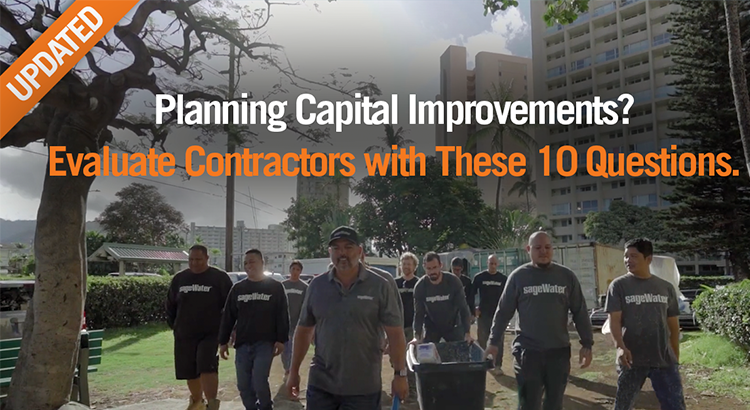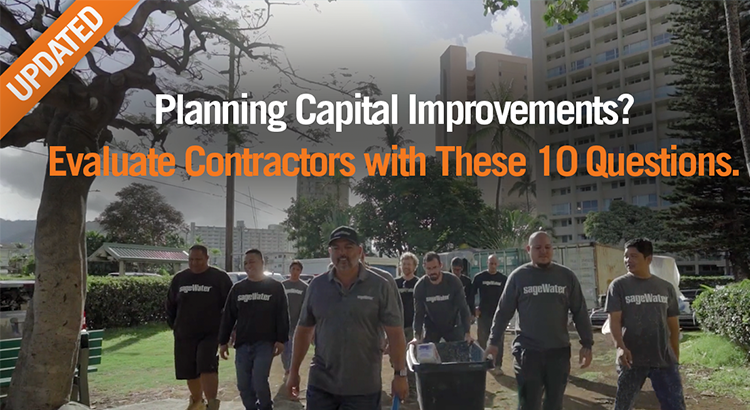
UPDATED: Planning Capital Improvements? Evaluate Contractors with These 10 Questions.
Earlier this year we published our most “liked” blog post, which listed 10 questions you can use to select the right contractor for a capital improvement project. Since the only constant is change, it’s already time for an update!
We’ve updated the list with a new question about how you can better manage the impact of inflation and supply chain constraints. This new addition to the top 10 is a question that will help you maintain project quality and avoid delaying or abandoning a critical capital improvement mid-way due to steep cost increases.
When planning a large capital improvement project, it’s crucial to select the right contractor. You want to find the right mix of skills, price, process, credentials, and capabilities.
Here are 10 questions to ask contractors that can help you recognize potential risks and make the best choice for your apartment or condominium community.
-
What Does Turnkey Mean to Them?
In a true turnkey project, one contractor completes every step in the process. Ask any contractor promising turnkey service who their employees actually work for. Are they direct employees, subcontractors, or 1099 employees working as hired help? Contractors that rely extensively on outsiders can create a risk because their workers may not be bound by your contract.
-
How Is Project Management Handled?
Some contractors will provide dedicated, on-site project managers who are available 24/7 in case any issues arise. Others may split their managers across two or more jobs, so they may not be as readily available. In addition to asking about your access to a project manager, ask about the project manager’s experience managing your specific type of project. Those who oversee multiple kinds of projects may have less experience with yours.
-
How Will They Communicate?
Ensuring property managers, condo boards, and residents know what will happen, and when, is vital for your project to run on schedule and with few complaints. Ask contractors if they have a communications program they use for each project and how they communicate (e.g., status meetings, town halls, paper or electronic notifications, etc.). Make sure you select the contractor whose communication methods meet your needs.
-
Do They Conduct Employee Background Checks?
Knowing who will be working in their homes can be very important to homeowners and residents. Verify how the contractor hires and screens employees by asking questions like:
- Do all your employees undergo a background check?
- Are they all legally permitted to work in the United States?
- Do any of them have criminal records?
- Do you randomly test for drugs and alcohol?
-
How Do They Handle Change Orders?
Some contractors will provide a very low initial bid, knowing they will use change orders later to make up the costs. Others will supply a more thorough bid to reduce surprises down the road. When checking references, ask former clients how many change orders they had to deal with.
-
How Do They Handle Requests For Information (RFIs)?
If the contractor comes across an unexpected condition, do they have a formal RFI process? Ensure they use formal documentation to detail what they found and to request input from the construction manager, engineer, or board who is overseeing the project.
-
How Are They Bonded and Licensed?
Understand the contractor’s bond limits. Bonding capacity is for the company as a whole, not an individual project. So, if a contractor has several other large projects going on simultaneously, they may not have enough bonding capacity for your specific job.
Also, find out the credentials of the team working on your property. If the people running the company are general contractors, who has the specialty licenses for trades like plumbing, electrical, elevators, etc.? If they rely on others’ licenses to get their job permitted and completed, those license holders often need to be present during inspections.
-
How Do They Handle Inspections?
Formal inspections ensure your project was completed safely, correctly, and to code. Ask your contractor how they manage inspections. Will they obtain all the required permits or expect you to obtain some? Who will be on-site to meet the inspector and show them the work? What do they do if they fail an inspection?
-
What Is Their Insurance Coverage?
Of course, any contractor working in your building should carry insurance, otherwise, your community runs the risk of paying out if there is an accident or problem. Look at a potential contractor’s certificate of insurance, including their liability limits, to make sure they are carrying enough insurance for your project and not just the minimum required.
-
How can they help you manage the impact of supply chain constraints?
Since the COVID-19 pandemic began, the costs of construction materials have risen higher and faster than inflation in the Consumer Price Index1. The war in Ukraine has exacerbated supply chain problems that make it hard for manufacturers to secure raw materials and satisfy demand. While the cost and delivery times for some materials are starting to stabilize, you still need to take precautions to ensure your project isn’t delayed, derailed, or in some other way compromised.
Inquire with your contractors about lead times for ordering materials and make timely decisions so that your project proceeds on schedule. If a material won’t be available in time, work with your contractor to see if there’s an acceptable alternative material.
For pricing transparency, look for escalation clauses in proposals that explain how a contractor will handle inflation pressures. It’s better to discuss upfront than learn deep in the project that they are cutting corners to stay true to a quoted price, or that you need to halt progress because you’re about to exceed your budget. Be sure to negotiate fair terms—e.g., that price increases will be based on commodities markets. And if there is no escalation clause, work it into your agreement. One last tip: if your project will be done in phases, ask your contractor if they can make bulk purchases upfront to hedge against future price increases.
In the end, selecting a contractor to perform your capital improvement project is a personal choice that balances who brings the best solution, price, process, credentials, and capabilities for your community. On a bid form, contractors may appear similar, but these 10 considerations often make the difference between a successful project and a frustrating renovation.
We’d love to hear from you.
Thanks for reading our blog! Contact us any time with questions about Simply Smarter Pipe Replacement for multifamily apartment and condominium communities.


